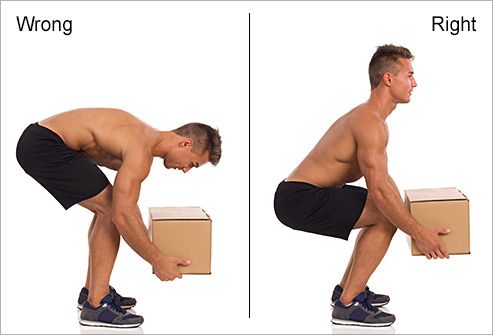Sprains and Strains
People who play sports or are physically active are familiar with stretched or torn ligaments, muscles, and tendons. Both cause swelling and inflammation. Sprains can give you bruises. Strains may trigger muscle spasms. Use RICE for early treatment -- rest, ice, compression, and elevation. Take an over-the-counter (OTC) pain reliever. See a doctor if it's numb or tingles, you can’t move a joint, or it doesn't get better within a week.
Tension Headache
This common type of headache feels like a band is squeezing your head. OTC painkillers, rest, and drinking water will often do the trick. Your headache should go away within hours, but it could last a couple of days. Plenty of rest, proper posture, less stress, and lots of fluids (without caffeine) may help you avoid one.
Migraine
Throbbing pain in the front or side of your head can put a hold on your daily activities. You might feel sick to your stomach, be sensitive to light, or have other symptoms. Find somewhere dark and quiet to rest. An ice pack may numb pain; a heating pad can relax tense muscles. An OTC pain reliever with a bit of caffeine may help if you catch a migraine early. Some people need a prescription to treat or prevent them.
Arthritis
The leading cause of disability in America is a group of more than 100 diseases that cause joint pain. Symptoms, which may come and go, often include swelling, pain, stiffness, and limited motion. They could be the result of wear and tear or of inflammation triggered by your immune system. Arthritis usually can't be cured, but you can often ease pain and manage the condition with your doctor's help.
Sprains and Strains
People who play sports or are physically active are familiar with stretched or torn ligaments, muscles, and tendons. Both cause swelling and inflammation. Sprains can give you bruises. Strains may trigger muscle spasms. Use RICE for early treatment -- rest, ice, compression, and elevation. Take an over-the-counter (OTC) pain reliever. See a doctor if it's numb or tingles, you can’t move a joint, or it doesn't get better within a week.
10/15
Tension Headache
This common type of headache feels like a band is squeezing your head. OTC painkillers, rest, and drinking water will often do the trick. Your headache should go away within hours, but it could last a couple of days. Plenty of rest, proper posture, less stress, and lots of fluids (without caffeine) may help you avoid one.
10/15
Migraine
Throbbing pain in the front or side of your head can put a hold on your daily activities. You might feel sick to your stomach, be sensitive to light, or have other symptoms. Find somewhere dark and quiet to rest. An ice pack may numb pain; a heating pad can relax tense muscles. An OTC pain reliever with a bit of caffeine may help if you catch a migraine early. Some people need a prescription to treat or prevent them.
10/15
Toothache
Tooth decay, cracked teeth, broken fillings, and gum disease are likely causes. You might not be a fan of the dentist, but if your toothache lasts more than a couple of days, you should go. If you don't take care of it, an inflamed area could become infected, leading to bigger problems. Tooth pain can also signal a sinus infection, a problem with the joint where your jaw meets your skull (TMJ), or grinding your teeth at night.
10/15
Neck Pain
Your neck is less protected than the rest of your spine, so it's vulnerable to sprains and strains. Those pains are usually temporary, and often, you won't need a doctor. Regular wear and tear, such as the disks breaking down, can also hurt. Good posture helps prevent pain. You might feel more serious neck injuries in other parts of your body, such as the upper back, arms, and legs, too.
10/15
Back Pain
As you age, it becomes more common. Back pain can be dull or sharp and last months at a time. Being overweight and lifting something the wrong way can cause it. Diseases including arthritis and cancer can affect your back and spine, and your genes can play a role, too. Treatments for most types of back pain include OTC medications and muscle relaxants, hot and cold packs, and exercise.
10/15
Frozen Shoulder
The pain is usually worse at night, when you lie on that side. Simple, everyday tasks can be hard to do. Your shoulder becomes stiff to the point where you can’t move it. Exercises and physical therapy can improve your range of motion. Untreated, it could take 2-3 years to "thaw." It mostly happens to people between 40 and 60. Women and people with diabetes are more likely to have this problem.
10/15
Tendinitis and Bursitis
These are swelling around a muscle or bone, usually brought on by the overuse or injury of a joint, like your ankle, elbow, knee, hip, shoulder, or wrist. Treat these with RICE, too. Call your doctor if the pain and swelling are bad, get worse, or if there's any redness.
Arthritis
The leading cause of disability in America is a group of more than 100 diseases that cause joint pain. Symptoms, which may come and go, often include swelling, pain, stiffness, and limited motion. They could be the result of wear and tear or of inflammation triggered by your immune system. Arthritis usually can't be cured, but you can often ease pain and manage the condition with your doctor's help.

10/15
Stomachache
It could be for a number of reasons, including indigestion, gas, and constipation, but generally it won't last for more than a few hours and isn't serious. OTC medicines may help a tummy ache or upset stomach feel better until it passes. Call your doctor if the pain is sudden and severe, lasts for days, or if you're vomiting blood, have bloody stool, or notice any other unusual symptoms.
Sciatica
This shooting pain can make either sitting or standing uncomfortable. You might feel weak, numb, and a burning or tingling in your leg, but it's not a cramp. It's a pinched nerve or slipped disk in your lower back. Sneezing and coughing can sharpen the pain. Sciatica usually goes away in a few weeks with rest and gentle exercise, but you should see your doctor. Most people who get it are between 30 and 50
Nerve Pain
Tingling, burning, numbness, and weakness can all signal a problem with your nerves. People with uncontrolled diabetes tend to get nerve damage in their feet, hands, arms, and legs. Shingles, a painful rash caused by the chickenpox virus traveling down nerves, can lead to ongoing pain. When your organs are affected, you could have trouble with digestion or peeing. Medications, physical therapy, and eating well can help.
Carpal Tunnel Syndrome
There's little evidence that keyboard overuse is at fault for one of the leading nerve disorders. Pecking at the computer could make the tingling and numbness in your fingers worse though, if you already have a pinched nerve. Rest first; avoid bending or twisting your wrist for a couple of weeks. Then try yoga or physical therapy. Sometimes medicines that reduce swelling can ease symptoms.
Sore, Swollen Feet
Rest and put your feet up! Ice them for 15-20 minutes at a time. If you must stand on a hard surface all day, try compression stockings, wear shoes with good support, and take breaks off your feet when you can. Women and people who have flat feet or high arches are more prone to plantar fasciitis, which makes the bottom of your heel hurt. Stretching is good for that.
Call your doctor when the pain is bad or if you don't know why your feet ache.
Your Shoulder
It’s not just a simple joint -- it’s a complex structure of muscles and tendons (which hold your muscles to your bones). It lets you scratch your back, drive your car, or get something off a shelf. But all those moving parts mean things can go wrong, which is why so many people have shoulder problems at some point.
source:webmd








